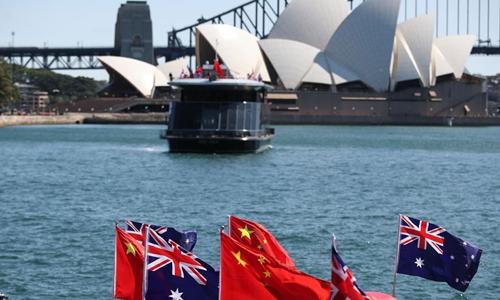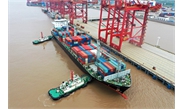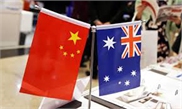
Chinese and Australian national flags are seen at an event in Sydney, Australia, September 8, 2019.Photo:Xinhua
This latest spat started with Australia's proposal for an independent global inquiry on the origins and spread of COVID-19. This week, China suspended imports from major Australian beef suppliers.
Australia, as a key US ally, leans toward the US for security while depending on China for trade. After all, it is a Western country culturally and politically, and geographically hanging off the edge of Asia.
With all the Western values engrained, Australia is siding with the US to find fault with China's emergence in Asia and the world - most notably Australia's ban on China's high-tech giant Huawei with unwarranted national security allegations. Furthermore, Australia's attempt to balance its anxieties and paranoia toward China's rise and its desire for strong ties with the US is clear.
Of course, Australia, as a sovereign country, does not want to be viewed as a US pawn, although it is one. In fact, some Australian scholars are trying to persuade their Chinese peers that Australia's China policy is actually independent. The Chinese side remains unconvinced. Australia has the same mentality as that of the US to contain China's rise. Existing US influence is so powerful that it can steer the orientation wheel of Australia's politics and policy.
As a member of the Five Eyes network, an intelligence-sharing alliance among Australia, Canada, New Zealand, the UK and the US, Australia acts as a fervent US follower. When the US deems it not a good time for it to pick a fight with China at the frontline, Australia often jumps out and tests the reaction of each side.
Malcolm Turnbull, Australia's 29th prime minister, once defined the China relationship in one word - "frenemy," a portmanteau of "friend" and "enemy." In his recently published memoir, he pointed to his speech during Asia's premier defense summit, the Shangri-La Dialogue, in June 2017, in which he expressed concerns over China's growing power, as the public start date of the current icy age between Australia and China. A few months later at a conference in Melbourne, attending Australian politicians, academics and former government officials raised concerns that the country's lack of an independent foreign policy from its conventional US-centric approach had undermined its own national interests.
Rational Australian experts are right in saying that Canberra's policy toward Beijing is ragged. But the question is how to save it. Australian politicians should realize that their country's security arrangements with the US and their adaptation of a rising China are not a zero-sum game.
In the history of China's foreign relations, China has not sponsored initiatives to worsen its ties with Western countries. Even when relations with Australia have been frosty in recent years, China did not resort to sanctions as punishment. Some Australian media have been quick to point out that China's latest import suspension is revenge for an Australia-initiated inquiry into COVID-19 and called it "economic coercion." This is a reflection of their own guilt and shows that they do not understand China's patient political culture. Australian Trade Minister Simon Birmingham has already said the two matters are "in no way related."
China hopes that Australia can have its independent China policy, and that its relations with the US do not target third countries - including China. The Chinese people hope Australian politicians could cherish the cooperation opportunities that benefit both sides and do not bring bilateral ties to a confrontational path.
China-Australia relations will largely depend on China-US relations, both of which will continue to experience downward trends for the foreseeable future. After all, Australia's role in China's foreign relations is not that critical at present.
The article was compiled by Global Times reporter Wang Wenwen based on an interview with Yu Lei, a chief research fellow at the Research Center for Pacific Island Countries, Liaocheng University. wangwenwen@globaltimes.com.cn


